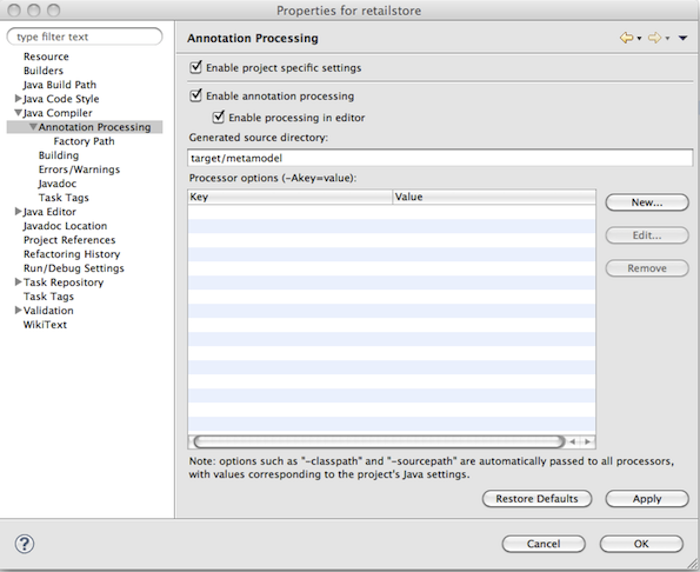Sto provando a creare una query con l'API Criteria da JPA 2.0, ma non riesco a farlo funzionare.Creazione di query tramite Criteria API (JPA 2.0)
Il problema è con il metodo condizionale "tra". Ho letto some documentation per sapere come devo farlo, ma poiché sto scoprendo JPA, non capisco perché non funzioni.
Innanzitutto, non riesco a vedere "creationDate" che dovrebbe apparire quando scrivo "Transaction_".
Ho pensato che fosse normale, poiché ho letto che il metamodel è stato generato in fase di esecuzione, quindi ho provato a utilizzare "Foo_.getDeclaredSingularAttribute (" value ")" invece di "Foo_.value", ma non lo è ancora lavorare affatto
Ecco il mio codice:
public List<Transaction> getTransactions(Date startDate, Date endDate) {
EntityManager em = getEntityManager();
try {
CriteriaBuilder cb = em.getCriteriaBuilder();
CriteriaQuery<Transaction> cq = cb.createQuery(Transaction.class);
Metamodel m = em.getMetamodel();
EntityType<Transaction> Transaction_ = m.entity(Transaction.class);
Root<Transaction> transaction = cq.from(Transaction.class);
// Error here. cannot find symbol. symbol: variable creationDate
cq.where(cb.between(transaction.get(Transaction_.creationDate), startDate, endDate));
// I also tried this:
// cq.where(cb.between(Transaction_.getDeclaredSingularAttribute("creationDate"), startDate, endDate));
List<Transaction> result = em.createQuery(cq).getResultList();
return result;
} finally {
em.close();
}
}
qualcuno può aiutarmi a capirlo? Grazie.
EDIT: qui è la fonte di transazione (quasi nulla in essa, da quando è stato automaticamente generato da Netbeans, dalla mia base di dati)
package projetjava.db;
import java.io.Serializable;
import java.util.Date;
import javax.persistence.Basic;
import javax.persistence.Column;
import javax.persistence.Entity;
import javax.persistence.GeneratedValue;
import javax.persistence.GenerationType;
import javax.persistence.Id;
import javax.persistence.NamedQueries;
import javax.persistence.NamedQuery;
import javax.persistence.Table;
import javax.persistence.Temporal;
import javax.persistence.TemporalType;
@Entity
@Table(name = "transaction")
@NamedQueries({
@NamedQuery(name = "Transaction.findAll", query = "SELECT t FROM Transaction t"),
@NamedQuery(name = "Transaction.findById", query = "SELECT t FROM Transaction t WHERE t.id = :id"),
@NamedQuery(name = "Transaction.findByIDAccount", query = "SELECT t FROM Transaction t WHERE t.iDAccount = :iDAccount"),
@NamedQuery(name = "Transaction.findByDescription", query = "SELECT t FROM Transaction t WHERE t.description = :description"),
@NamedQuery(name = "Transaction.findByCreationDate", query = "SELECT t FROM Transaction t WHERE t.creationDate = :creationDate"),
@NamedQuery(name = "Transaction.findByAmount", query = "SELECT t FROM Transaction t WHERE t.amount = :amount")})
public class Transaction implements Serializable {
private static final long serialVersionUID = 1L;
@Id
@GeneratedValue(strategy = GenerationType.IDENTITY)
@Basic(optional = false)
@Column(name = "ID")
private Integer id;
@Basic(optional = false)
@Column(name = "IDAccount")
private int iDAccount;
@Basic(optional = false)
@Column(name = "Description")
private String description;
@Basic(optional = false)
@Column(name = "CreationDate")
@Temporal(TemporalType.DATE)
private Date creationDate;
@Basic(optional = false)
@Column(name = "Amount")
private double amount;
public Transaction() {
}
public Transaction(Integer id) {
this.id = id;
}
public Transaction(Integer id, int iDAccount, String description, Date creationDate, double amount) {
this.id = id;
this.iDAccount = iDAccount;
this.description = description;
this.creationDate = creationDate;
this.amount = amount;
}
public Integer getId() {
return id;
}
public void setId(Integer id) {
this.id = id;
}
public int getIDAccount() {
return iDAccount;
}
public void setIDAccount(int iDAccount) {
this.iDAccount = iDAccount;
}
public String getDescription() {
return description;
}
public void setDescription(String description) {
this.description = description;
}
public Date getCreationDate() {
return creationDate;
}
public void setCreationDate(Date creationDate) {
this.creationDate = creationDate;
}
public double getAmount() {
return amount;
}
public void setAmount(double amount) {
this.amount = amount;
}
@Override
public int hashCode() {
int hash = 0;
hash += (id != null ? id.hashCode() : 0);
return hash;
}
@Override
public boolean equals(Object object) {
// TODO: Warning - this method won't work in the case the id fields are not set
if (!(object instanceof Transaction)) {
return false;
}
Transaction other = (Transaction) object;
if ((this.id == null && other.id != null) || (this.id != null && !this.id.equals(other.id))) {
return false;
}
return true;
}
@Override
public String toString() {
return "projetjava.db.Transaction[id=" + id + "]";
}
}

è possibile inviare fonte per 'Transaction' pure? –
Si prega di vedere sotto. – Pym